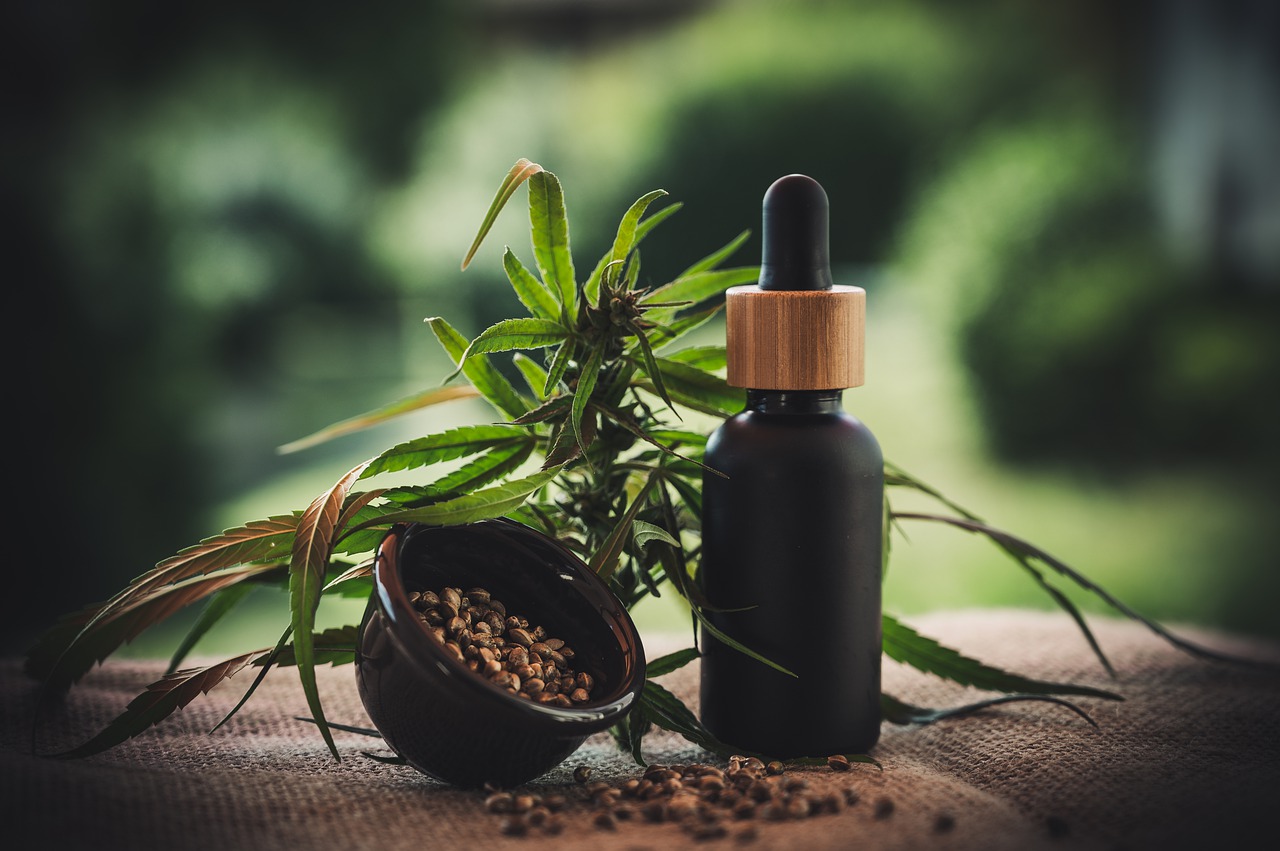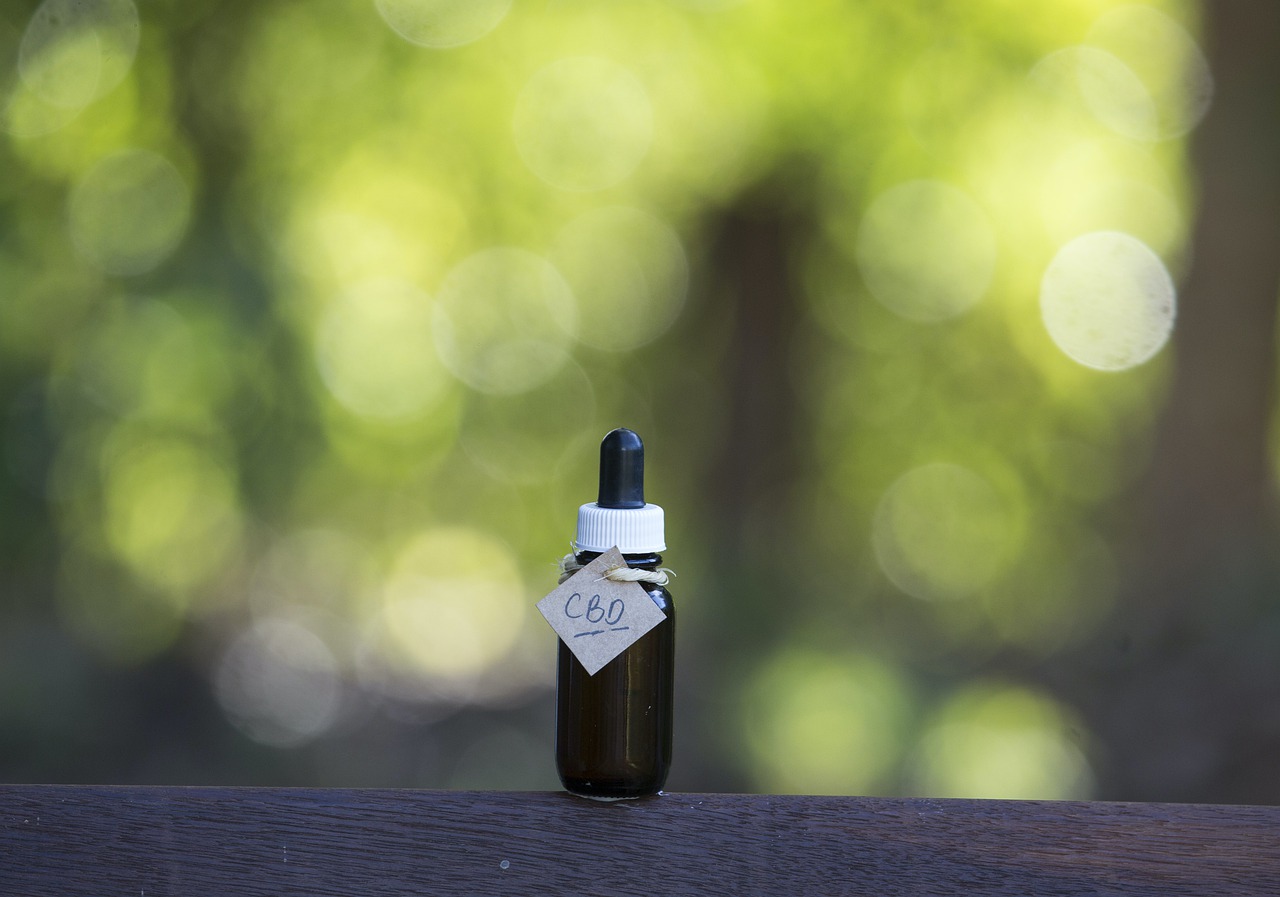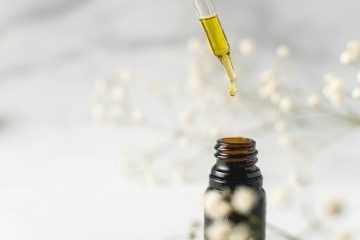Before we go into the benefits and functions that CBD can have for yours and other people’s well-being, we will give you more information about how CBD oil works in the body and how it is possible that Cannabidiol can have so many different functions, on so many different physical and mental states.
The key to it all is called the endocannabinoid system (abbreviated ECS) which is a network of receptors found in both the brain and large parts of the body. ECS consists of receptors, endocannabinoids and enzymes. Endocannabinoids are cannabinoids that are not supplied from outside but which the body itself produces.
Endocannabinoids have the task of stimulating CB1 and CB2 receptors in the body, while enzymes are there to break down endocannabinoids when they have completed their tasks.
Endocannabinoids
Endocannabinoids are mainly divided into two groups and go under the names anandamide and 2-arachidonoylglyerol. The body has the ability to produce these itself and help to stimulate the endocannabinoid receptors, which in turn help to control a number of the body’s functions.
Among other things, the receptors control how the body handles stress, anxiety, anxiety, the immune system, can affect pain, secretion of neurotransmitters and much more.
Receptors
The various receptors in the endocannabinoid system are called CB1 and CB2 receptors. CB1 receptors are mainly found in the central nervous system which can help relieve pain. CB2 receptors, on the other hand, are found in greater concentrations in the peripheral nervous system and can help reduce inflammation in the body.
Enzymes
When endocannabinoids complete their task, they will be broken down by enzymes. Enzymes have the task of breaking down endocannabinoids in ECS. These are called FAAH (fatty acid amide hydrolase) and MAG lipase (monoacylglycerol acid lipase).
Cannabinoids can also stimulate
It is not only endocannabinoids that can stimulate the receptors in ECS. Cannabinoids from Cannabis Sativa also have the ability to stimulate these receptors and thus affect how the endocannabinoid system works in the body.
Since the endocannabinoid system, among other things, signals when inflammation is going on in the body, you can activate its anti-inflammatory properties by adding CBD. This is the key that CBD can be effective on many of the physical and mental conditions that are due to inflammation.
You can educate yourself more about how CBD works with the endocannabinoid system in a favorable way for a number of ailments and disease states.

CBD for better sleep
A lot of people suffer from sleep difficulties. It includes everything from insomnia to interrupted sleep and poor quality sleep. Regardless of the type of sleep difficulties you have suffered from, there are different types of medications available. Most of them are strong and can thus also create an addiction and other negative side effects.
For those who want to try a natural alternative, products with CBD can be an alternative. For example, many people consider CBD oil helpful for these problems.
A study conducted in 2019 examined the effect of CBD on insomnia and anxiety and one month into the study, 66.7% of the test subjects had improved sleep and 79.2% experienced reduced anxiety. The study further recommended studies on what doses of CBD should be given for maximum results.
In addition to having a direct calming effect, CBD oil can help with better sleep by relieving various forms of pain. For example, chronic pain and joint problems that can otherwise interfere with sleep.
Although further studies on the subject are needed, there are also studies showing that CBD oil can help patients suffering from RBD (REM sleep Behavior Disorder).
Adjunct Professor of Medical Science Claes Hultling, says the following:
“So far, we have seen a significant difference, especially when it comes to sleep. These patients who previously could only sleep for a few hours in a row now get 5-6 hours of consecutive sleep, and that is the only reason to continue. ”
CBD for anxiety
Different forms of mental illness can affect us all. Suffering from anxiety is very common among both women and men of all ages and can seem devastating to the person affected by it. Anxiety and depression are problematic in several ways, among other things it is complicated because they, like other mental disorders, are not visible to the outside world and can therefore be difficult to get help for.
Today, there are a plethora of different anti-anxiety drugs. Unfortunately, these medications are often strong and can affect the user in such a way that they become sleepy, are not allowed to drive a car, or cause other forms of side effects.
CBD oil or other CBD products do not cause such side effects, but in accordance with the study above and other studies such as this (under the section CBD for better sleep), it has been seen that CBD helps with anxiety.
CBD for depression
Anxiety and depression are closely intertwined, so it is not surprising to find that CBD has also been shown to have a positive effect on people suffering from depression. In particular, when performing tests on animals, it has been found that CBD oil has an immediate effect on depression.
In antidepressants, weeks of medication may often be required before you notice a difference. It is also not uncommon for these drugs to initially cause increased worry and anxiety before the body gets used to the dosage.
There is still no definite information on whether CBD oil could be used as a medicine for depression or not, but it is known that the substance has one can be effective because it can affect how receptors in the body react to the serotonin present in the body. CBD does not add to, and does not increase, the amount of serotonin that antidepressants do.
Note! If you suffer from depression, we do not advise you to stop taking your medication. If you want to try CBD capsules or other related products, you can consult your doctor.

CBD for chronic pain
One of the most common reasons people use medical cannabis is to relieve pain. The side effects of medications such as Sativex that contain both CBD and THC are that the latter have psychoactive effects that can affect, among other things, by making the user “high” and giving side effects such as paranoia. In addition, the user builds up a certain tolerance to THC, which means that the dose needs to be increased to give the same effect.
Something that does not apply to CBD.
In this study from 2018, researchers have concluded that CBD reduces chronic pain caused by neurological and inflammatory reasons.
This means, among other things, that people with fibromyalgia (a condition that causes pain due to chronic inflammation in the body) may feel helped by CBD products. CBD can also relieve pain in these patients by relieving stress and helping with relaxation, which further helps to alleviate pain and inflammation.
CBD against rheumatism
One of the main properties of CBD oil is its anti-inflammatory properties. Because CBD stimulates the endocannabinoid system, which in turn affects how the body signals and handles inflammation, CBD has a good effect on all the conditions that are based on inflammation. These include joint pain.
In a study done by ST doctor Forogh Razazi, he cites results where medical studies have shown that cannabis-based drugs such as CBD have had a significant effect in studies on mice. In these studies, mice were injected with osteoarthritis and then treated with CBD.
You have been able to see a noticeable improvement after only 2 days. In the conclusion, the doctor states that it is correct to consider that cannabis-based drugs can have both analgesic and anti-inflammatory properties, but he believes that more studies are needed on the subject.
It is therefore too early to say that CBD can cure rheumatism. However, there is much to suggest that it can significantly improve the condition. And the fact that a lot of rheumatologists testify about how CBD helped them with the pain remains.
CBD ointment for skin problems
When talking about the positive effects of CBD, it is usually about CBD capsules or CBD oil, but there are also CBD ointments that are usually the better choice of CBD products for skin conditions such as acne, eczema and psoriasis.
CBD for acne
Acne is a skin condition that occurs when the sebaceous glands in the skin become inflamed. The deeper the inflammation, the worse the acne. Acne is common in adolescence but it is not uncommon for acne to occur at other ages and especially when the person in question suffers from some form of hormonal imbalance.
A product such as a CBD ointment or CBD cream with anti-inflammatory properties can help reduce inflammation and thus also reduce acne.
However, CBD has also been shown to have a dampening effect on how much fat the skin produces by the cannabinoids in CBD products helping to control the sebaceous glands’ secretion of sebum. A CBD ointment should be applied directly to the affected area to be effective.
CBD for psoriasis
CBD products may also be suitable for use against the skin condition psoriasis. Psoriasis is an autoimmune disease that in many cases is also genetic. What happens is that inflammation occurs in the skin because the skin cells of a psoriasis-affected person’s skin cells are replaced at frequent intervals of 3-5 days instead of being replaced after about every 30 days as they should.
This causes itching and gives red spots on parts of the body or the whole body of the sufferer.
CBD can help people with psoriasis because it stimulates the endocannabinoid system which also affects the longevity of skin cells. People with psoriasis testify that they have been helped by CBD.
For this type of condition, a CBD cream or CBD ointment is usually used which can alleviate the symptoms and help prolong the life of the skin cells.
CBD for eczema
The soothing and anti-inflammatory properties of CBD are not only helpful against specific skin conditions such as acne and psoriasis.
In fact, CBD oil and especially CBD ointments can be applied to all types of eczema and help soothe the rash and add moisture (when using ointment).
CBD for the immune system
The endocannabinoid system (ECS) is in many ways still a mystery to us. What is known about this versatile system is that it plays a part in many of the body’s functions. Specifically, it is the CB2 receptors in ECS that regulate the immune system. And we now know that can stimulate these receptors by adding cannabinoids such as Cannabidiol.
CBD for dementia / Alzheimer’s
A common reason why doctors, the Medical Products Agency and similar bodies around the world advise people against using CBD products as treatment for various disease states is that they believe that there is not enough research on the subject of CBD oil or CBD in general. But the fact is, there are an incredible number of studies studying CBD oils and their effect on various forms of disease.
There has been a lot of research in different areas, but one of the areas where most research has been done, and has received such good results that it is recommended to start test treatment, is CBD as a treatment for dementia and Alzheimer’s. These studies often include tests that have tested giving patients CBD oils with both CBD and THC, but there are also a large number of studies that contain only CBD.
It is still too early to say whether CBD has the ability to cure dementia and Alzheimer’s, but there is much to suggest that the substance may have a very positive effect on this disease state that researchers and doctors have struggled to find a treatment for for many years now.
The reason why it is believed that CBD can be effective as a treatment is that Alzheimer’s is worsened by inflammation that occurs in the brain. As a result, memory loss occurs, among other things. When brain functions such as memory ability are affected, additional oxygen is released and so-called oxygen stress occurs.
CBD is an antioxidant that can dampen or completely eliminate the effects of inflammation, oxygen buildup in the brain and shrinkage of brain cells.
In 2011, a study was conducted by researchers Tim Karl and Carl Group, which established that CBD promotes the growth and development of brain cells, which reduces the loss of memory and other brain functions in Alzheimer’s patients.
CBD oil for epilepsy
In recent years, it has become increasingly common to use CBD oil for epilepsy. Nowadays, there are CBD-based drugs (such as Epidiolex) that are approved in both the US and Europe. Many users testify that this CBD oil caused their seizures to decrease or subside completely after they started taking it regularly.
A study conducted by American researchers shows that among the participants in the study who were given cannabidiol instead of placebo had a reduction in so-called drop seizures of 44 percent over a period of one month. Which is a great result.
CBD oil for diabetes
According to studies done in both mice and rats, CBD can have a good effect against diabetes specifically by stimulating CB2 receptors). First of all, it has been shown that CBD can possibly lower blood sugar levels, lower cholesterol and levels of bad fat and increase insulin production.
CBD has also been shown to reduce the swelling and pain of swelling (which can often affect diabetic patients), and overall reduce the risk of getting diabetes by turning bad fat into good fat and thus increasing the body’s ability to use glucose.
CBD against abstinence
One topic that has been talked about a lot is whether CBD can curb abstinence. CBD oil is said to be effective both for those who try to quit smoking and on heroin addicts, for example, who experience severe abstinence. A study comparing abstinence in heroin addicts could establish that CBD had a positive effect against abstinence.
The test subjects who had been assigned CBD had significantly less withdrawal symptoms compared to the test subjects given placebo.
In this study, the CBD-based drug Epidiolex was used, which does not contain any form of THC but only CBD extracted from hemp.
CBD oil for ADHD
ADHD stands for Attention Deficit Hyperactivity Disorder and is a neurological disorder that can cause several symptoms that include hyperactivity, impulsivity, restlessness and difficulty concentrating. According to research, ADHD may be due to the person suffering from a deficiency of substances such as dopamine, norepinephrine and serotonin. These substances are important neurotransmitters.
Today, ADHD is medicated with the help of drugs that help increase the amount of neurotransmitters in the brain by binding to them and ensuring that they are not broken down as quickly.
CBD oil gives the same result, that is, CBD increases the amount of neurotransmitters (such as dopamine) in the brain but with a different approach. When CBD is ingested, the CB1 receptors of the endocannabinoid system are stimulated to produce more dopamine. We have previously written about CBD for ADHD here.
CBD against PTSD
Just as CBD oils have been shown to be effective against anxiety, stress and depression, it has been found that CBD can be effective against PTSD (post-traumatic stress disorder). In this study from 2019, it has been seen that CBD can help patients with PTSD.
PTSD is currently being treated with various antidepressant and anti-anxiety drugs, but if CBD can be used instead, it may prove to be a better alternative for those who experience side effects from currently existing drugs.

CBD oil is good for a lot of things
As you probably understand, the endocannabinoid system is very complicated as it has a finger in the pie in many of the body’s functions. And it is not limited to the various diseases we mentioned above. It has also been seen that intake of CBD oil had a certain effect on cancer cells where tests showed mixed results. But it has not yet been proven that CBD oil can cure cancer (of course).
However, users also testify that they have been helped with things like PMS, and it has been seen that cannabidiol products have an antipsychotic effect (and thus have the potential to be helpful in treating schizophrenia), can help with allergies, have a positive effect on the heart , against the disease Parkinson’s, headache, and can have a soothing effect on tanned skin.
With or without THC?
Some of the studies that have been done have used cannabis extracts that contain both THC and CBD. Nowadays, a lot of research is done on how CBD oil works without THC because it would be beneficial to be able to use CBD as a medicine without including THC.
The reason for avoiding THC is the substance’s psychoactive effects that help to make the user high. CBD does not make you high but stimulates the receptors in a different way than THC.
Does CBD Really Work?
There are many voices nd options about CBD oil and CBD products in general. Some claim that the substance is ineffective or believe that there are not enough clinical studies on the substance. This is despite the fact that there are thousands of studies on CBD oil and its various uses.
Others are afraid of getting high on CBD or think it is drug classified because it is closely related to cannabis. This is despite the fact that THC is the psychoactive and drug-classified substance in cannabis and that most CBD oils do not contain any directly traceable amount of THC. Cannabidiol products of this kind will therefore never make you high.
The sum of this is simply that you get to decide for yourself whether CBD oil or CBD products can help you.
Summary
CBD is a very versatile substance that has the ability to affect the endocannabinoid system in the body. Through this, CBD oil and other CBD products, according to research done in recent years, can help alleviate a number of different ailments.
Most prominent and clear are the results made in connection with the substance’s anti-inflammatory properties.
CBD products have been shown to be effective for a large group of people when it comes to various ailments and diseases and many users testify to a better mood.


